This website uses cookies so that we can provide you with the best user experience possible. Cookie information is stored in your browser and performs functions such as recognising you when you return to our website and helping our team to understand which sections of the website you find most interesting and useful.
Betzillion’s Interview With Football Commentator Derek Rae: About Early Standing, Professional Preparation, and Football Innovations
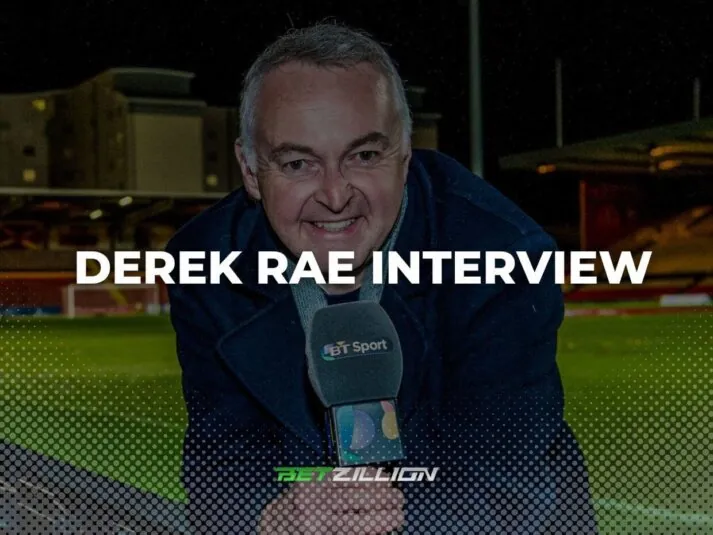
We are very excited to talk with Derek Rae and appreciate his willingness to answer questions that will help our BetZillion readers learn more about the true commentators’ legend.
Early Years and Development
Mr. Rae, tell us about your first steps in football. What did attract you to commentating rather than playing on the field?
The first time I realised I was interested in football commentary was at age 7 in 1974! We had just bought our first stereo cassette recorder, and it was exciting and new to be able to record my voice and play it back while commentating in my own make-believe world with the 1974 World Cup going on in the background.
I used to play football enthusiastically too on the street in our home in Aberdeen, in the park or on the school playground. Summer days and nights were often non-stop matches with jackets for goalposts and players constantly arriving and departing. But I found that I would end up commentating on bits of the action while playing, which was a source of amusement.
What were your first impressions of working at major football tournaments? Was there anything that particularly surprised or impressed you?
My first major tournament as a commentator was the 1990 World Cup in Italy, and it was a whole new world with the charismatic Italian cities and learning new food at the time. I still think of that World Cup when I see Spaghetti Vongole Veracci on a menu!
I loved looking out over the entire media tribune in Genoa, the venue for my first game and seeing scores of commentators just like me but speaking in many different languages. That was a bit of a dream come true for someone who loved languages and I have become friends with many colleagues from around the world who do the same job down the years. We all have so much in common.
Tell us about the 1986 incident when you replaced David Francey during the commentary of the Scottish Premier Division match between Kilmarnock FC and Dumbarton FC.
It was all a blur and happened so quickly in the spring of 1986. I had been sending tapes to David, who was my early broadcasting hero for several years, to get his feedback. One day, unbeknownst to me, he passed it along to his producer, Charles Runcie, who got in touch and invited me down to the BBC HQ in Glasgow. He later had me do reports from an Aberdeen v Celtic game and it seemed to go well.
But then suddenly, on a Friday afternoon, while I was studying at Aberdeen University, he called and told me they had an emergency. David was struggling with a knee problem and would I like to fill in for him at Kilmarnock on the live radio game the next day? I jumped on the train and before I knew it, was doing my first professional commentary deputising for my favourite commentator at 19. Surreal!
How did you feel when you were taken to commentate on the Rous Cup match between England and Scotland the following week after replacing David Francey?
Well, when I got back to Aberdeen after the 3-hour train journey, there was a message to call Charles. He said he felt it had gone brilliantly and asked if I was ready for Wembley in midweek. I could hardly believe it, but it turned out Kilmarnock was a bit of an audition and, as someone at the BBC later on said, a bit like going from the chorus line to the lead role, except I wasn’t even a member of the chorus line until that day! After I put the phone down, I just stared into space and smiled. At 19, you don’t always feel pressure; you just live.
Anyway, I had never been to Wembley or even attended the historic England-Scotland game although we watched it religiously every year on television. Yet here I was with microphone in hand broadcasting it on Radio Scotland, next to former Scotland captain John Greig and seasoned broadcaster Mike Ingham. Scotland lost 2-1 but it was an unforgettable experience and such an unlikely way to begin a professional career.
Professional Career
You really have to live football and cherish watching it. It’s no more complicated than that, really, although I commend the many talented colleagues who, through podcasts in multiple languages, share their knowledge of things like tactics and the transfer market. I’m always happy to listen to someone with an intimate knowledge of a specific area of the game. The day we think we know it all is the day to give it up.
You’ve commented on matches in various countries and leagues. Which ones were the most exciting and why?
My heart beats for Germany more than any other country, and it will always be this way. Part of it has to do with studying German from a young age and it was always my best subject at school. I used to listen to NDR radio broadcasts of Bundesliga matches, which we would get due to the proximity of Aberdeen to Hamburg via the North Sea with no hills on the way, and it was a magical world of escapism for me. I often think how lucky I am that I get to spend a bit chunk of the year broadcasting the Bundesliga to international viewers and consequently going to German venues.
As a Scot, I always love being back in Scotland and, especially in my home city of Aberdeen. The Dons were arguably the best team in Europe for a spell in the early 1980s and the club have begun amazingly nice to me on recent visits back. Between 2009 and 2017, I returned to be the lead TV voice of Scottish football for ESPN UK and BT Sport, and those years – a bit like a return to my commentary roots – were among my favourites. Of course, I love all football, but German and Scottish football win out when it comes to tugging at the heartstrings.
How do you prepare for a match commentary? Do you have any special rituals or methods? When preparing for a match, do you focus more on team actions, or do you prefer to analyse specific personalities?
I‘m a bit old-fashioned in that I still write everything by hand in tiny script and colour code it. It’s just something I took from my language studies, and I’ve been doing it this way ever since. People look at it and wonder how I can even make sense of it, but remember, it’s a learning tool, so everything is in my brain for match day. It’s definitely not for show or for someone else to use.
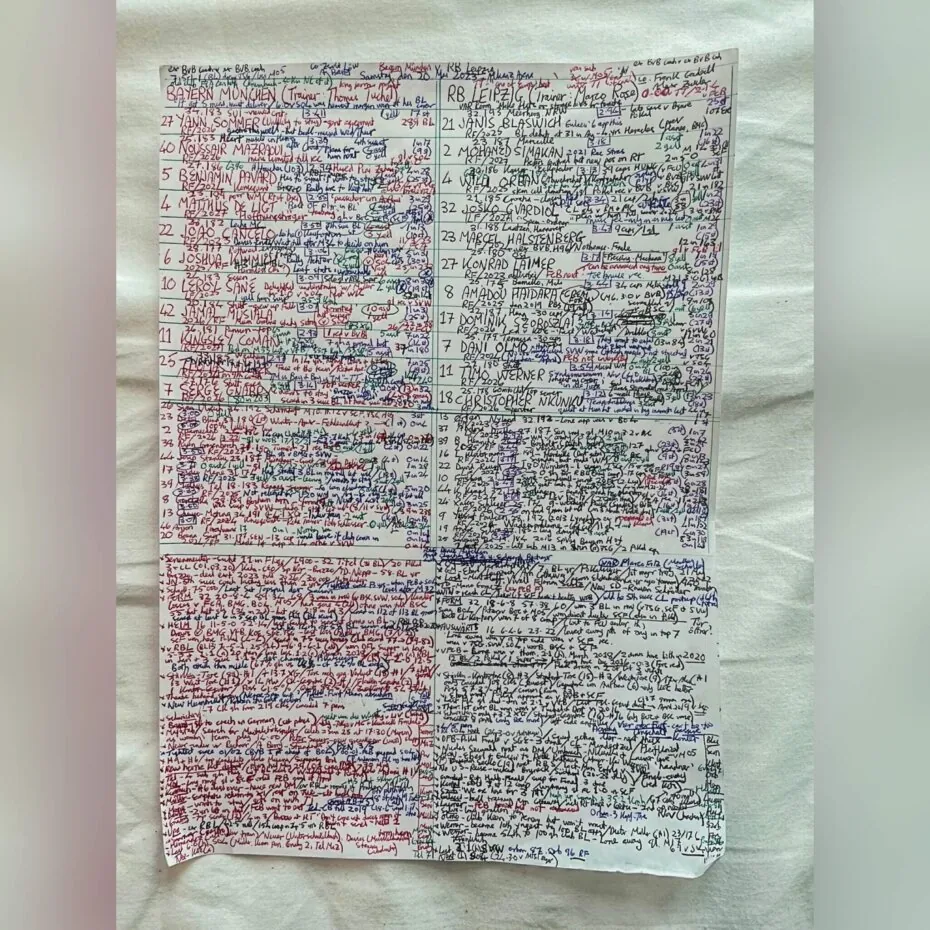
Derek Rae match notes for Bayern vs Leipzig game, 2023 (Source: https://x.com/eurofootcom/status/1659893397350383617)
I think that causes the confusion. I have a system, and the important thing is that I understand it, no one else. Strangely to some, I write everything first and only in the hours before a game do I watch recent videos of teams. I like to visualise first and then see how it all looks in reality last. But there are many hours of preparation that go into every game, and at busy times, you’re juggling 3-4 games at once.
You are known for your deep understanding of football. How do you keep your knowledge at such a high level?
Firstly, that’s kind of you to say. Secondly, you really have to live football and cherish watching it. It’s no more complicated than that, really, although I commend the many talented colleagues who, through podcasts in multiple languages, share their knowledge of things like tactics and the transfer market. I’m always happy to listen to someone with an intimate knowledge of a specific area of the game. The day we think we know it all is the day to give it up.
In your opinion, what qualities are most important for a successful football commentator?
The voice is important. It should be clear and, above all, distinctive. But how we pitch the voice is also key. The job is so much more than shouting and yelling, and so we try to use our voices in a more subtle way. Blending in with the action and becoming part of the soundtrack is important for me. We don’t want to overpower the game, but if we’ve done a good job, our commentary should fit the moment.
Knowing when to pause is as important as intuitively understanding when to speak, injecting a certain light and shade. Sometimes, less is more on TV. Preparation is paramount. Without that, we can only do the job on a very limited basis. But we spend a lot of time protecting the voice, much as a singer might do, as it is our musical instrument.
Tell us about your experience working on the FIFA video games. How does it differ from commentating on real matches?
Working on EAFC, as the game is now titled, has introduced my work to a whole new generation, I feel. In fact, there are some who think I only commentate on video games which is an indication of the power and reach of EAFC. It has been a joy to work with the production team since we all began collaborating in 2018, and it truly is a team effort.
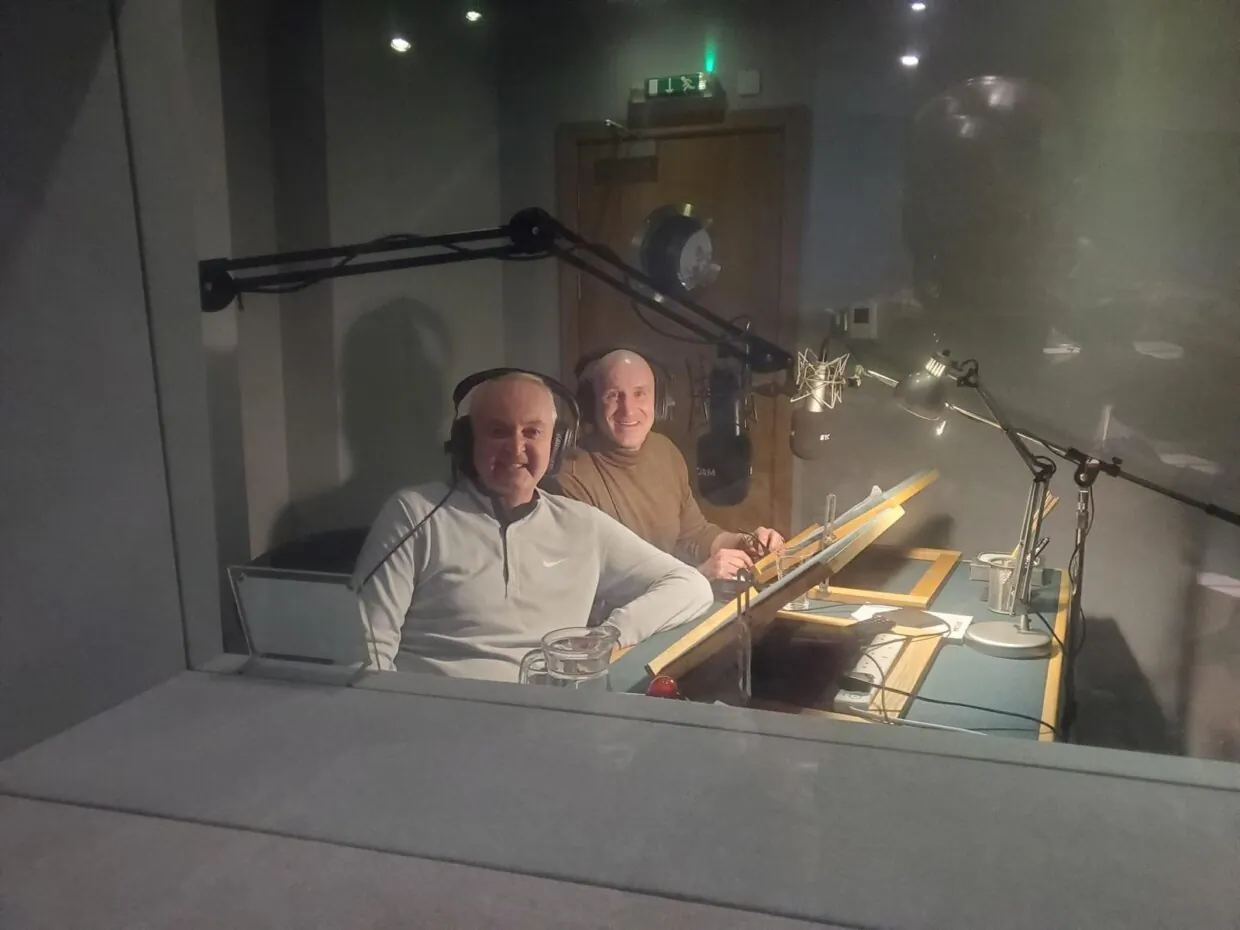
Derek Rae in London with Stewart Robson recording for EAFC25
What differs from a live game is I have to perform in the theatre of the mind the whole time as we record. I‘m not seeing the player actually in front of me participating in their game and instead have to visualise and as authentically as possible, replicate what I might say in an actual match situation. It’s a fun challenge every day we record with a very talented production and audio crew. I love every minute of it and am well aware that the game represents a big part of some fans’ football youth.
You have commented on Bundesliga matches for many years. How do you assess the development of German football during this time? Will Borussia Dortmund soon be able to mount a real challenge to Leverkusen and Bayern?
Viewed from within Germany, these are great times for the Bundesliga, with huge crowds and a football culture that other leagues wish they could have. Viewed from the outside, I often hear from people who somehow want it to be a copy of the Premier League, but I would argue that for the atmosphere and openness of football, it’s the best league anywhere. The atmosphere is derived from 50+1, which puts fans first. Oligarchs can’t just barge their way in and rip the soul away from a club. The Bundesliga is special in this regard, and once fans discover its unique ingredients, German football becomes a part of it.
Whether Dortmund can do what Leverkusen did last season, I’m not sure. It took the first unbeaten Bundesliga season in history to deny Bayern, so it was otherworldly what Bayer Leverkusen achieved. Anyone who watched the league last season knows how good they truly were.
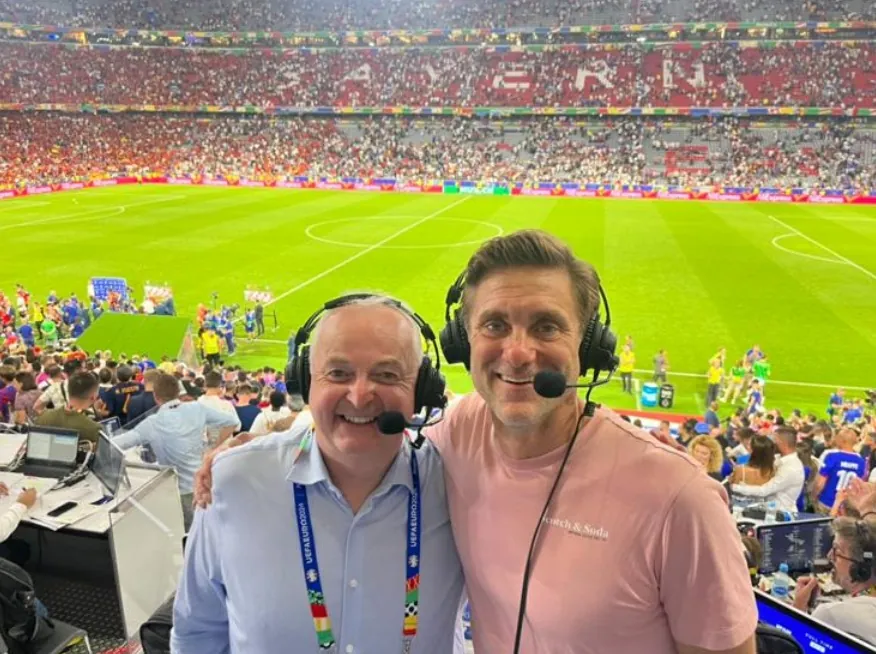
Derek Rae with co-commentator Rob Green for Fox at the Euro 24 semi in Munich, Spain vs France
Do you consider fans/viewers’ generational differences when commentating? Do you often incorporate new youth words and phrases to engage the younger audience without alienating the older ones?
I think so, yes, and this is something that is constantly evolving. If you listen to commentators from back in, say, the 1970s and 1980s in the UK we were all a bit more posh sounding as that was the BBC house style. Gradually, this changed. Words and language are ever-changing, and it’s important in a broadcast to serve as many viewers as possible. Ultimately, you have to be yourself, but words come in and out of fashion and in daily life our jabbed speech is a reflection of this.
Have you noticed a decline in interest in football among the younger generation? How can we engage the TikTok generation in a game that can end 0-0 after 90 minutes?
I just think there are more things to watch and do now. When I started commentating, live games were rare, so we tended to be glued to every second of every minute as viewers. Now, it is a matter of holding attention.
I heard recently from a Bundesliga colleague that people watch, on average 4 hours of football per week, but that can be spread over multiple matches on multiple platforms, so people are picking and mixing. So, we have to find ways of keeping fans entertained without overcooking the broth. It can be a tricky balance to strike. But a good commentator, hopefully, is always thinking about that balance.
About Technologies and Advanced Data
We’re always in danger of forgetting football at its best is a simple game. Semi-automated offside does make sense, though, as it’s factual, much like goalline technology, and will speed up the game. Fewer interruptions will be a good thing. However, the 5 substitutes law, which I remember was meant to be a temporary pandemic measure, quickly became permanent, and I’m not sure the game is better for it.
Does the abundance of available statistics and analytics make modern viewers and football enthusiasts more knowledgeable about the sport?
It can, but it can also be misleading. Statistics are a seasoning, a pinch of salt to add flavour, but they are not and can never be the whole dish.
I recall debating the merits of a particular player on social media and giving an opinion purely based on what my eyes told me. In some fans‘ minds there must be metrics in place before you can judge a player. Metrics can be helpful but also a crutch.
For example, who was the best outfield player in the Bundesliga last season? My vote goes to Leverkusen‘s Granit Xhaka. How many assists did he record? Exactly zero! Xhaka was the man for the second last pass, but statistics don’t pick that up. So, you use your eyes first and let the numbers flow from there. Never the other way around.
When preparing for matches, do you use detailed statistics or analytics (like xG, xA, PPDA)?
I do, yes, and the Bundesliga‘s statistical data is extensive. Our Bundesliga half-time and full-time graphics always show the XG numbers for both sides.
What are your thoughts on modern football? Are there any trends that worry or delight you? What innovations would you like to see in football shortly (semi-automatic offside detection system, reverse substitutions, temporary player ejections)?
I think we’re always in danger of forgetting football at its best is a simple game. Semi-automated offside does make sense, though, as it’s factual, much like goalline technology, and will speed up the game. Fewer interruptions will be a good thing. However, the 5 substitutes law, which I remember was meant to be a temporary pandemic measure, quickly became permanent, and I’m not sure the game is better for it.
My biggest gripe is invisible numbers on modern shirts and some of the biggest clubs in the world are guilty here. Numbers are meant to be identifiable to all yet now it seems to be viewed as an element of fashion design rather than a means by which everyone in the stadium or watching on TV knows who’s on the ball. This is one area where the NFL outdoes our sport: large, clear numbers with a sharp colour contrast that people can see! FIFA and UEFA should have stricter rules on this.
What is your attitude towards VAR, and what would you change/improve? Should football rules be changed/adjusted to make the system more effective and fair?
I was a big proponent of VAR at the start of its life and still feel it would be wrong not to use the technology when it exists. But there is something wonderful about the early rounds of the DFB-Pokal here in Germany with no VAR. Fans and players can celebrate goals with gusto and without worrying about after-the-fact decisions.
I feel we are now doing what we said wouldn’t happen, reviewing far too many incidents, which for me, fall in the grey zone. This was not the original plan. The idea was to correct big decisions that were clearly wrong to pretty much everyone. We have taken it well beyond that, and the spectacle is much poorer for it. As for technology generally, whether it’s using a chip in the ball to measure statistics or the ref cam as deployed to good effect in the Bundesliga, I’m all for innovations that help us learn.
Personal Views and Interests
Being from Aberdeen, I’ve been in the company professionally of our home team’s former manager, Sir Alex Ferguson, many times and can only say he is the kind of person who would have been a success in any area of life, a brilliant person. He was always several steps ahead of most people. Having worked with so many former professionals, I can only say it’s a privilege to see how a player or manager thinks about the game.
You have worked with many famous football players and coaches. Are there any who particularly impressed or inspired you? How so?
Being from Aberdeen, I’ve been in the company professionally of our home team’s former manager, Sir Alex Ferguson, many times and can only say he is the kind of person who would have been a success in any area of life, a brilliant person. He was always several steps ahead of most people. Having worked with so many former professionals, I can only say it’s a privilege to see how a player or manager thinks about the game.
Besides football, do you have any other hobbies or interests? How do you spend your free time?
I walk a lot and languages are a passion. Unlike some people in my industry who may understandably view travel as a necessary evil, I enjoy discovering new places and cultures.
Are there any cultural peculiarities of fans in different countries that have impressed or surprised you?
I enjoy the subtle differences from country to country. In Germany, the organised walk to the stadium “Fanmarsch” is unrivalled. I love the sound of cowbells at a game in Switzerland, and in Argentina, the combination of good, tender steak and passionate football is amazing.
You were at Euro 2024. Share your impressions of this event. Was it the biggest football festival in recent years?
It goes from as my favourite international tournament, and my first was in 1990. It felt like the coming together of European nations and cultures we have been missing due to the pandemic and, of course, some unusual choices for hosting tournaments. Germany, at the heart of Europe, with venues not a million miles from each other, was the party we needed. Personally every match felt like a home game.
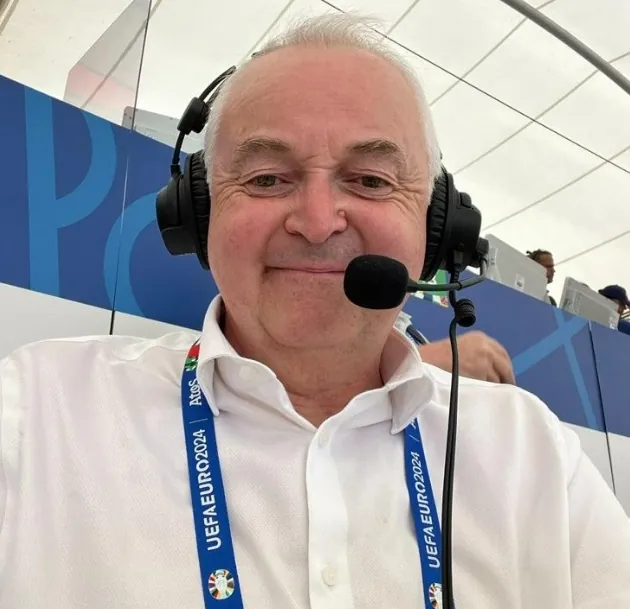
Derek Rae at the Euro 2024 commentating for Fox in Frankfurt
Which team at this year’s Euro did you like the most, and which the least?
Spain were the best team and deserving winners. We don’t always get to say that in a tournament. I was lucky to commentate on most of their games. Sadly, my own countryб Scotland, disappointed me most of all. The fans set the highest bar of all and were immensely popular, but the team was a big letdown, and if someone were to say Scotland were the worst, least exciting team of all, I couldn’t argue.
Who are your personal favourites for the next World Cup in 2026?
Spain have a great new generation, and so they start as favourites for me, with Germany, who I feel are growing under Julian Nagelsmann. But Argentina and Brazil must both be taken seriously.
Derek, thank you so much for your time and honesty! Thanks to you, our readers will be more informed about football and will follow your work. You are a true gem in the world of sports commentary. We believe this is not our last conversation and wish you continued career success!
Learn more about Derek Rae on Wikipedia, or visit his X page.





Imagine getting a random call as a student, like... hey, wanna go live tomorrow?
Derek’s story is inspiring
can we talk about how Derek Rae always predicts what’s about to happen? magic
I could listen to Derek Rae talk about football all day. The man is a true expert
Derek Rae’s insights into early career development, professional preparation, and football innovations offer a fascinating look at how commentary and the game continue to evolve together.